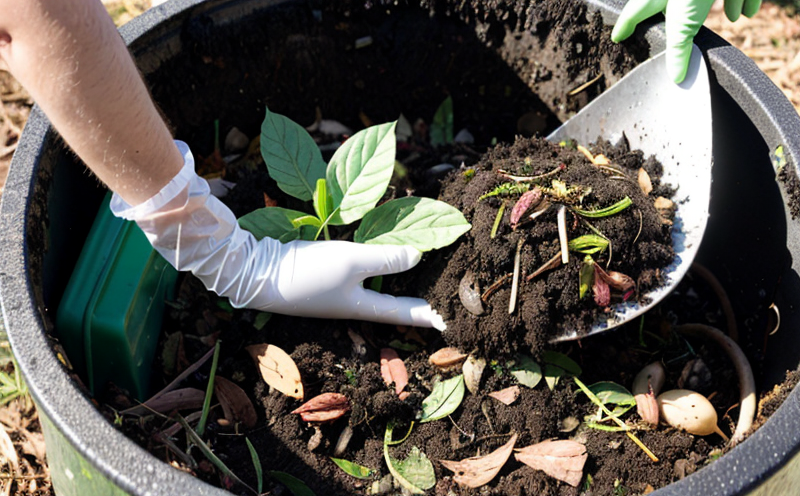EN 15883 Microbiological Hygiene Testing in Waste Systems
The EN 15883 standard is pivotal for ensuring the microbiological hygiene of waste systems, which are essential components in modern waste management and composting processes. This service focuses on providing comprehensive testing that aligns with international standards to ensure the safety and integrity of waste handling facilities. The primary audience for this service includes quality managers, compliance officers, R&D engineers, and procurement teams who need reliable data to meet stringent regulatory requirements.
Microbiological hygiene in waste systems is crucial for preventing the spread of pathogens that could pose health risks to humans and animals. Waste management systems are complex environments where various microorganisms can thrive under different conditions. The testing procedure outlined in EN 15883 aims at identifying potential hazards by assessing bacterial, viral, and fungal contamination levels within the waste materials.
The standard covers a wide range of tests designed to evaluate the microbiological safety of solid waste and composting processes. It includes methods for sampling, sample preparation, cultivation techniques, identification procedures, and quantitative analysis of microorganisms present in these environments. Compliance with this standard ensures that waste facilities meet high standards set by regulatory bodies worldwide.
Our laboratory adheres strictly to the guidelines provided by EN 15883 when performing microbiological hygiene tests on waste systems. We employ advanced microbiological techniques and state-of-the-art equipment to ensure accurate results. Our team of highly qualified scientists uses these tools to conduct thorough analyses that provide clients with detailed reports on the microbial content in their samples.
Microbial contamination can have severe implications for public health if not properly managed. By adhering to EN 15883, we help our clients stay compliant and protect both human and environmental health. Our comprehensive testing services offer peace of mind knowing that every aspect of the waste management process is thoroughly examined before it reaches its final destination.
The importance of microbiological hygiene cannot be overstated in today’s world where sustainability practices are gaining prominence. Ensuring safe handling and disposal of wastes not only benefits immediate communities but also contributes to long-term environmental sustainability efforts globally. By leveraging our expertise in EN 15883 compliant testing, organizations can contribute positively towards creating safer environments for all.
Scope and Methodology
| Sample Type | Description |
|---|---|
| Solid Waste | Collection from various points within the waste facility. |
| Compost Material | Sampling at different stages of composting process. |
| Microorganism Type | Analytical Technique |
|---|---|
| Bacteria | Culture-based enumeration and PCR. |
| Viruses | Antigen detection, RT-qPCR. |
| Fungi | Morphological identification, ITS sequencing. |
The scope of our EN 15883 microbiological hygiene testing in waste systems encompasses several key areas. We begin with proper sampling techniques tailored to the specific nature of solid waste and compost material being analyzed. This ensures that all relevant parts of the sample are represented accurately during subsequent stages.
Once collected, samples undergo rigorous preparation processes designed to preserve their integrity while facilitating precise analysis. Depending on the type of microorganism targeted (bacteria, viruses, fungi), different analytical techniques are employed. These methods range from traditional culture-based enumeration and PCR for bacteria to antigen detection and RT-qPCR for viruses, along with morphological identification combined with ITS sequencing for fungi.
Our laboratory follows all aspects outlined in EN 15883 meticulously ensuring compliance with international standards while delivering robust data supporting informed decision-making regarding waste management practices. Through meticulous adherence to these procedures, we strive to maintain the highest levels of accuracy and reliability in our testing services.
Benefits
Compliance with EN 15883 offers numerous advantages for organizations involved in waste management and composting processes:
- Enhanced Safety: Ensures that no harmful pathogens are released into the environment, protecting public health.
- Regulatory Compliance: Helps clients meet stringent regulatory requirements set by various authorities globally.
- Sustainability: Promotes responsible waste management practices contributing to environmental sustainability goals.
- Informed Decision-Making: Provides reliable data aiding strategic planning and operational improvements within the organization.
The benefits extend beyond mere compliance; they also contribute significantly towards establishing trust among stakeholders including customers, suppliers, and regulatory bodies. Our services play an integral role in fostering such positive relationships by delivering consistent, accurate results that reflect the true state of microbial activity within waste systems.
Customer Impact and Satisfaction
By leveraging our EN 15883 compliant microbiological hygiene testing services, customers experience tangible impacts on their operations:
- Increased Confidence: Clients gain confidence knowing that every aspect of waste management processes has been thoroughly examined.
- Improved Reputation: Compliance with international standards enhances the reputation and credibility of organizations involved in waste management.
- Reduced Risks: Minimized risks associated with microbial contamination leading to safer working environments for employees and reduced liability concerns.
- Enhanced Efficiency: Informed decision-making based on reliable data optimizes resource allocation and operational efficiency within the organization.
We are committed to exceeding customer expectations by providing exceptional service, prompt communication, and high-quality results. Our team works closely with each client to understand their unique needs and deliver tailored solutions that meet both current standards and future challenges in waste management practices.





